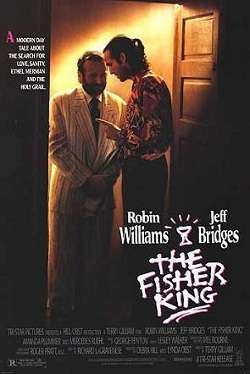The Fisher King

If you are looking for the trope about rulers whose lands reflect their state of being, hop on over to Fisher King.
The Fisher King is a comedy-drama film made in 1991, written by Richard LaGravenese and directed by Terry Gilliam. It stars Jeff Bridges, Robin Williams, Mercedes Ruehl, Amanda Plummer and Michael Jeter. The film is about a radio shock-jock who tries to find redemption by helping a homeless man whose life he inadvertently shattered.
Jack Lucas (Jeff Bridges), a cynical, arrogant shock jock talk radio host, becomes suicidally despondent after his insensitive on-air comments inadvertently prompt a depressed caller to commit multiple murders at a popular Manhattan bar. Three years later, while heavily intoxicated and depressed, he attempts suicide. Before he can do so, he is mistaken for a homeless person and is attacked and nearly set on fire by ruffians. He is rescued by Parry (Robin Williams), a deluded homeless man who is on a mission to find the Holy Grail, and tries to convince Jack to help him. Jack is initially reluctant, but comes to feel responsible for Parry when he learns that the man's condition is a result of witnessing his wife's horrific murder at the hands of Jack's psychotic caller. Parry is also continually haunted by a hallucinatory Red Knight, who terrifies him whenever he shows any confidence.
Jack learns that Parry had slipped into a catatonic state following his wife's death and had remained there for a few years. When he emerged he seemed obsessed with the tale of the legend of the Fisher King, a form of which Parry recounts to Jack. The legend varies, but all iterations possess three elements: the Fisher King was charged by God with guarding the Holy Grail, but later incurred some form of incapacitating physical punishment for his sin of pride, and had to wait for someone to deliver him from his suffering. A simpleminded knight named Percival, who was also referred to in the movie as "The Fool", healed the wounds with kindness to the king, asking him why he suffers and giving him a cup of water to drink. The king realizes the cup is the grail and is baffled that the boy found it, as demonstrated in the closing exchange: "I've sent my brightest and bravest men to search for this. How did you find it?" The Fool laughed and said "I don't know. I only knew that you were thirsty." Echoes of the legend recur throughout the film, but in a continually shifting manner, so that it sometimes appears that Lucas is Percival to Parry's Fisher King, sometimes vice versa, and sometimes that one or the other is re-enacting part of the story with another character (most obviously in Parry's self-assigned quest to obtain the Grail from the man he believes is its guardian).
- Crazy Homeless People: Parry, who believes that he is the Fisher King on a quest to retrieve the Holy Grail.
- Fan Disservice: Parry dancing around naked in Central Park, covered in dirt.
- Fisher King: The Trope Namer is discussed, but not quite invoked. See Magical Realism.
- Homeless Hero: Parry.
- Jerk with a Heart of Gold: Jack.
- Jabba Table Manners: Both Lydia and Parry have less than proper manners when at the Chinese Restaurant.
- King Arthur: Parry's semi-symbolic quest for the Holy Grail.
- Magical Realism: Especially the scene in Grand Central Station.
- Male Frontal Nudity: Shame about the context...
- Mock Guffin
- Odd Couple: Parry and Jack.
- Redemption Quest: everything Lucas does for Parry.
- Shock Jock: Jack Lucas
- Shout-Out: There is a Brazil poster hanging in the Video Shop which was also directed by Terry Gilliam.
- Spontaneous Choreography: The Central Station scene.
- Stalking Is Love: Averted Trope. Lydia never gets to know how long Parry has...eh...known her.
- Teens Are Monsters
- Transvestite: This movie may have the most lovable Drag Queen ever conceived.
- A World Half Full